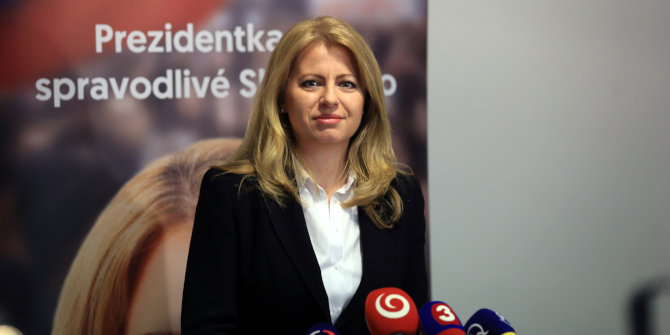 Zuzana Čaputová emerged as the winner from Slovakia’s presidential election on 30 March. Erika Harris writes that although the election of Čaputová has been viewed as a step away from populist and nationalist politics, the battle for the country’s political future is only just beginning ahead of parliamentary elections due to be held by spring 2020.
Zuzana Čaputová emerged as the winner from Slovakia’s presidential election on 30 March. Erika Harris writes that although the election of Čaputová has been viewed as a step away from populist and nationalist politics, the battle for the country’s political future is only just beginning ahead of parliamentary elections due to be held by spring 2020.
Slovakia’s presidential election was fought a year after a young journalist, Ján Kuciak, who investigated what turned out to be a high-profile fraud case and his fiancée, Martina Kušnerová, were murdered in their flat in February 2018. This murder triggered massive demonstrations, under the banner ‘Movement for decent Slovakia,’ demanding resignations of the then prime minister Robert Fico and interior minister Robert Kaliňák. Both eventually resigned under the pressure of protesters and the unwavering support they received from President Andrej Kiska. Five people have been charged with Kuciak’s murder, including a controversial businessman, Marián Kočner, who came to symbolise the corruption in Slovak politics after a decade of domination by Fico’s ruling party Smer.
The presidential election on 30 March was won by Zuzana Čaputová with 58.3% against her rival, an EU diplomat, Maroš Šefčovič, backed by the Smer with 41.7%. Čaputová, a political novice, will be the first female president in Slovakia. She campaigned against corruption or what she expressed as ‘people pulling strings from behind.’ Her political style, devoid of aggressive rhetoric, quiet determination and appeal to democratic values and decency resonated with younger and more educated voters who became fed up with the impunity, arrogance and political style of leading politicians. Interestingly, she became first known for winning a 14-year long fight against a company trying to build an illegal land-fill site and which was represented by the same businessman, Kočner, who is now charged with ordering the murder of the journalist investigating him.

Zuzana Čaputová, Credit: Slavomír Frešo (CC BY-SA 4.0)
Her rather unexpected, but very successful campaign riding on a wave of popular discontent has been reported with enthusiasm by the foreign press suggesting a ‘time for change’ (Večernji list, 1 April 2019), an opportunity for a ‘new unburdened generation’ (Tages-Anzeiger, 1 April 2019) to leave behind the populist-nationalistic conflictual politics which in Slovakia seemed to have returned to the 1990s. Slovakia has ‘bucked the trend’ (Reuters, 30 March 2019) that has seen populist, anti-immigration, anti-EU politicians make gains across the continent. From that perspective there is every reason to celebrate her victory which shows that not all ‘Central Europe is lost to populism’ (Sydsvenskani, 1 April 2019). Here, it is important to mention that Slovakia is different from other Visegrád countries (Poland, Hungary, the Czech Republic), because it is the only Eurozone country in the region and generally, Euroscepticism is not a part of mainstream political parties’ policies.
Starting her acceptance speech by thanking her supporters in Slovak, Hungarian, Ruthenian and Roma languages, thus addressing the main minorities in Slovakia, she continued to say how happy she was that: ‘it is possible not to succumb to populism, to tell the truth, to raise interest and gain the confidence of voters without aggressive vocabulary and personal attacks’ (Sme, 31 March 2019).
So, why the question mark in the title of this piece? There are a number of reasons for some caution. First, the president in Slovakia has a largely ceremonial role and does not have power to change parties’ policies. The president however appoints prime ministers and can veto appointments of state prosecutors and senior judges; this may further curb the ambition of the former prime minister Fico whose intension to become a senior judge has already been rejected once by the former president Kiska.
More concerning however is the very low turnout in the second round of the elections (42%). It is clear that large parts of the population did not feel represented by either of the two remaining candidates. There is a lot of support in Slovakia for populist-nationalists, a rejection of liberalism and anti-Western sympathies. For example, Marian Kotleba, the leader of the parliamentary extreme right People’s Party Our Slovakia (ĽSNS), a party that openly expresses admiration for the Nazi-sponsored wartime clerico-fascist Slovak State, engages in violence against Roma and loathes democratic institutions, won 10% in the first round of the vote. While until recently it was assumed that this party has no coalition potential, the Smer has recently sought its support to halt the ratification of a European Treaty designed to combat violence against women (together with the populist We are Family party and the centre-right Slovak National Party). With the campaign for the 2020 general elections having been kicked off by the result of the presidential elections, one can no longer assume that the coalition potential of extremists remains off the table.
Čaputová’s victory has one way or another been a referendum on the current government. So, the battle for a country’s political future – moving towards more autocratic populist governments in line with Slovakia’s neighbours Hungary, Poland and the Czech Republic, or sustaining the premise of liberal-democratic institutions and values – has just begun.
Please read our comments policy before commenting.
Note: This article gives the views of the author, not the position of EUROPP – European Politics and Policy or the London School of Economics.
_________________________________
 Erika Harris – University of Liverpool
Erika Harris – University of Liverpool
Erika Harris is a Professor at the University of Liverpool. She is an expert on studies of nations and nationalism generally, but specifically in Central Europe, the post- Soviet space and the Balkans.




1 Comments